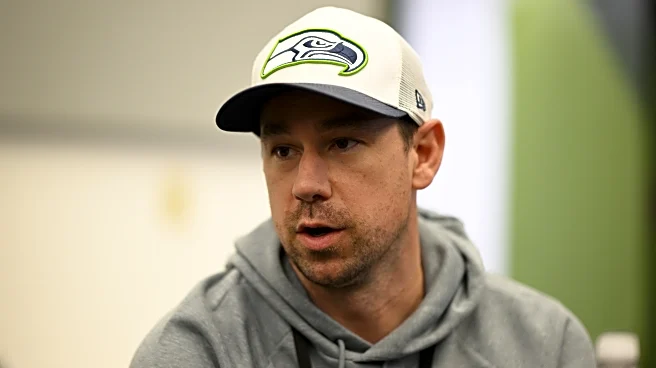What's Happening?
UCLA is actively pursuing James Madison coach Bob Chesney to fill its coaching vacancy, as reported by 247Sports. Chesney, who has led James Madison to a No. 21 ranking in the AP Top 25, is also considered
a potential candidate for Penn State. Rick Neuheisel, a former UCLA coach, has indicated that Chesney is a top choice for UCLA, but Chesney may be waiting for an opportunity closer to his Pennsylvania roots. Chesney has a successful track record, including multiple Patriot League Coach of the Year awards and conference championships during his tenure at Holy Cross. His current salary at James Madison is $833,495, the highest in the program's history since joining the FBS ranks.
Why It's Important?
The potential hiring of Bob Chesney by UCLA could significantly impact both the Bruins and James Madison. For UCLA, securing a coach with Chesney's proven success could revitalize the program and enhance its competitiveness in the Power Four conferences. Chesney's decision could also influence Penn State's coaching search, as they seek to replace James Franklin. The move would affect James Madison's football program, which has thrived under Chesney's leadership, potentially altering its trajectory in the Sun Belt Conference. The coaching carousel highlights the dynamic nature of college football, where coaching changes can have widespread implications for teams and conferences.
What's Next?
If Chesney accepts the UCLA position, he would be tasked with leading a West Coast program for the first time, presenting new challenges and opportunities. UCLA would need to finalize contract negotiations and prepare for the transition. Meanwhile, James Madison would begin its search for a new head coach to maintain its recent success. Penn State may continue to evaluate candidates, possibly considering Chesney if he remains available. The decisions made by these programs could influence recruiting strategies and team performance in the upcoming seasons.
Beyond the Headlines
Chesney's potential move to UCLA or Penn State underscores the broader trend of coaching mobility in college football, where successful coaches are often sought after by larger programs. This trend raises questions about the stability and loyalty within college sports, as well as the impact on student-athletes who may face changes in coaching staff and team dynamics. The financial aspects of coaching contracts also highlight the economic pressures and incentives in collegiate athletics.










